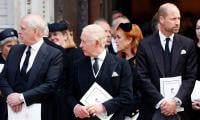Iran says nuclear deal ‘within reach’ if West shows goodwill
Tehran: Iran’s top diplomat said on Thursday that an agreement to revive his country’s nuclear deal with world powers was "within reach" but that this depended on the goodwill of the West.
Foreign Minister Hossein Amir-Abdollahian also said on Twitter that negotiations in Vienna were "proceeding with seriousness" and that the removal of sanctions was a "fundamental priority".
The talks resumed on Monday after Iran paused them in June after the election of ultraconservative President Ebrahim Raisi. European diplomats had warned on Tuesday that "we don’t have the luxury to spend time on niceties" and that they would assess the "seriousness" of Iran’s position in the next 48 hours.
In his tweet on Thursday, Iran’s foreign minister said the expert talks were continuing and that he was in daily contact with his deputy and lead negotiator, Ali Bagheri. "Good deal within reach if the West shows good will. We seek rational, sober and result-oriented dialogue," said Amir-Abdollahian.
The goal of the Joint Comprehensive Plan of Action, or JCPOA, is to make it practically impossible for Iran to build an atomic bomb, while allowing it to pursue a civilian nuclear programme.
The 2015 accord offered Iran a lifting of economic sanctions in return for strict curbs on its nuclear activities. But the deal started to unravel in 2018 when then US president Donald Trump pulled out and began imposing sanctions on the Islamic republic.
In turn, Iran, which denies it wants to acquire a nuclear arsenal, has gradually abandoned its commitments since 2019. The remaining parties to the 2015 agreement -- Britain, China, France, Germany and Russia -- are participating directly in the Vienna talks. At Iran’s insistence, the United States is doing so only indirectly.
Meanwhile, US Secretary of State Antony Blinken said Thursday it was not too late for Iran to revive its nuclear deal with world powers, but cautioned that optimism was low. "I have to tell you, recent moves, recent rhetoric, don’t give us a lot of cause for optimism," he said.
"But even though the hour is getting very late, it is not too late for Iran to reverse course" to save the 2015 deal aimed at preventing Tehran from building an atomic bomb, Blinken told reporters in Stockholm on the sidelines of a meeting of the Organisation for Security and Cooperation in Europe (OSCE). In a phone call with Blinken on Thursday, Israeli Prime Minister Naftali Bennett called for the "immediate cessation" of talks between Iran and major powers in Vienna, which resumed on Monday after a five-month hiatus.
Blinken declined to comment directly on the request. "We’re going to know very, very quickly, I think in the next day or two, whether Iran is serious or not," he said.
"In the very near future, the next day or so, we will be in a position to judge whether Iran actually intends now to engage in good faith." The 2015 agreement offered Iran a lifting of economic sanctions in return for strict curbs on its nuclear activities.
The goal was to make it practically impossible for Iran to build an atomic bomb, while allowing it to pursue a civilian nuclear programme. But the deal started to unravel in 2018 when then US president Donald Trump pulled out and began imposing sanctions on the Islamic republic.
In turn, Iran, which denies it wants to acquire a nuclear arsenal, has gradually abandoned its commitments since 2019. US President Joe Biden has said he is willing to return to the deal as long as Iran also resumes the original terms.
-
 Gigi Hadid Talks About 'relieving Tension' Amid Having Hashimoto's Disease
Gigi Hadid Talks About 'relieving Tension' Amid Having Hashimoto's Disease -
 Sarah Ferguson Is 'persona Non Grata', Prince William Makes It Clear To Everyone
Sarah Ferguson Is 'persona Non Grata', Prince William Makes It Clear To Everyone -
 Northern Lights Alert On Valentine’s Day: How, Where & Best Time To Watch Auroras
Northern Lights Alert On Valentine’s Day: How, Where & Best Time To Watch Auroras -
 Dennis Quaid Reveals What Keeps His Marriage To Laura Savoie Healthy
Dennis Quaid Reveals What Keeps His Marriage To Laura Savoie Healthy -
 Mustafa Suleyman Says Microsoft Is Building Its Own AI Superintelligence
Mustafa Suleyman Says Microsoft Is Building Its Own AI Superintelligence -
 Jessica Alba, Cash Warren Finalize Divorce After 16 Years Of Marriage
Jessica Alba, Cash Warren Finalize Divorce After 16 Years Of Marriage -
 China’s AI Boom Takes Center Stage At Spring Festival One Year After DeepSeek Stirred The Industry
China’s AI Boom Takes Center Stage At Spring Festival One Year After DeepSeek Stirred The Industry -
 James Van Der Beek Called His Sixth Child Jeremiah 'healing For Us' Before His Death
James Van Der Beek Called His Sixth Child Jeremiah 'healing For Us' Before His Death -
 Elon Musk Vs Reid Hoffman: Epstein Files Fuel Public Spat Between Tech Billionaires
Elon Musk Vs Reid Hoffman: Epstein Files Fuel Public Spat Between Tech Billionaires -
 Gordon Ramsay Denies Victoria Beckham Got Handsy With Brooklyn At His Wedding
Gordon Ramsay Denies Victoria Beckham Got Handsy With Brooklyn At His Wedding -
 Gordon Ramsay Makes Unexpected Plea To Brooklyn As He Addresses Beckham Family Feud
Gordon Ramsay Makes Unexpected Plea To Brooklyn As He Addresses Beckham Family Feud -
 Prince Harry Warns Meghan Markle To 'step Back'
Prince Harry Warns Meghan Markle To 'step Back' -
 Selena Gomez Explains Why She Thought Lupus Was 'life-or-death'
Selena Gomez Explains Why She Thought Lupus Was 'life-or-death' -
 New Zealand Flood Crisis: State Of Emergency Declared As North Island Braces For More Storms
New Zealand Flood Crisis: State Of Emergency Declared As North Island Braces For More Storms -
 Nancy Guthrie Case: Mystery Deepens As Unknown DNA Found At Property
Nancy Guthrie Case: Mystery Deepens As Unknown DNA Found At Property -
 James Van Der Beek's Brother Breaks Silence On Actor's Tragic Death
James Van Der Beek's Brother Breaks Silence On Actor's Tragic Death



